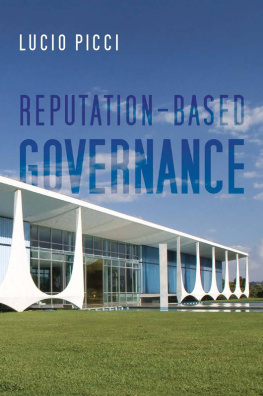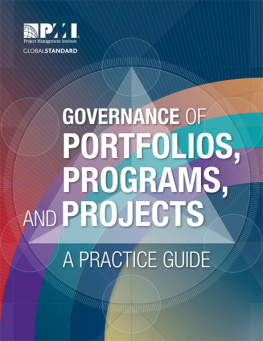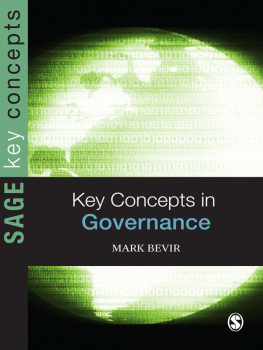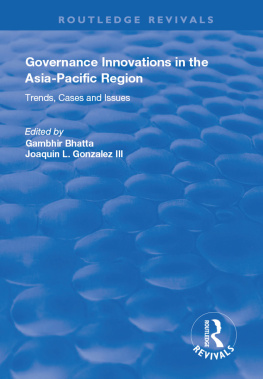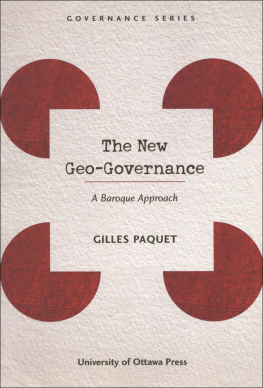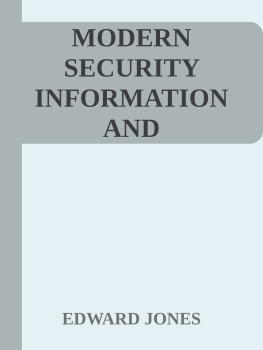Stanford University Press
Stanford, California
2011 by the Board of Trustees of the Leland Stanford Junior University. All rights reserved.
No part of this book may be reproduced or transmitted in any form or by any means, electronic or mechanical, including photocopying and recording, or in any information storage or retrieval system without the prior written permission of Stanford University Press.
Printed in the United States of America on acid-free, archival-quality paper
Library of Congress Cataloging-in-Publication Data
Picci, Lucio, 1965
Reputation-based governance / Lucio Picci.
p. cm.
Includes bibliographical references and index.
ISBN 978-0-8047-7329-4 (cloth : alk. paper)
ISBN 978-0-8047-7743-8 (electronic)
1. Political planning. 2. ReputationPolitical aspects. 3. Internet in public
administration. 4. Transparency in government. 5. Political participation.
I. Title.
JF1525.P6P53 2011
352.3'4dc22
2010035569
Cover image: Palcio do Alvorada, Brasilia
Preface
In this book, I discuss the role and the relevance of reputation in governance, and argue that an intelligent use of widely available Internet technologies would strengthen reputational mechanisms and significantly improve public governance. I will propose a governance model that is reputation-basedhence the title of the book.
The study I present offers an analysis of public governance and public administration and is multidisciplinary. Overstepping the barriers that separate different disciplines presents risks, and my first challenge in writing this book was to guarantee its intelligibility. In this respect, my goal was to provide a discussion that is rigorous, but accessible to experts from different areas. As a result, the reader may occasionally find explanations of concepts that are well known. In those instances, I beg the reader for patience, and I grant permission to overlook the few lines or pages in question, as I fully endorse Daniel Pennacs Readers Bill of Rights, Rule no. 2: The right to skip pages.
The second basic challenge to writing a multidisciplinary book is, of course, for the writer, who should be at ease in each of the disciplines involved. Though I have several years of experience in the relevant fields, this is no reason for confidence. I have, however, been fortunate enough to benefit from the comments, advice, and criticisms of several colleagues and friends who have certainly helped me to correct at least some of my shortcomings.
The scope of the book explains the long list of intellectual debts that I accumulated over the years. Some of the ideas presented here were initially discussed at meetings that took place more than a lustrum ago at the Astrid think tank in Rome, benevolently presided over by Franco Bassanini. The issue of reputational incentives for public procurement allowed for lively discussions within the scientific committee of Consip (the Italian public procurement agency), of which I was a member between 2002 and 2005. Consips president in those years, Gustavo Piga, contributed to creating a lively intellectual environment where new ideas were always welcome.
Many thoughtful colleagues made useful criticisms or brought to my attention work that contributed to improvements in the argument. They include Evelyn Brodkin, Marco Casari, Osvaldo Croci, Giampiero Giacomello, Nicholas Gruen, Raimondello Orsini, and Susan Rose-Ackerman. Others gave me their comments after reading a draft of the whole book. My gratitude goes to Brunetta Baldi, Marco Bertamini, Giliberto Capano, and Gennaro Zezza for putting up with a manuscript the bolts of which still needed tightening. A particular thank-you for their very attentive reading and for the sometimes crucially valuable suggestions that followed goes to Fred Thompson and an anonymous reader of a previous version of this book.
Over the years, I have enjoyed conversations on different aspects of governance with Miriam Golden, with whom I coauthored more than one paper. One of these was an article that we published in 2005 in Economics and Politics , which is amply cited in Chapter 7 of this book. My gratitude to her oversteps the boundaries of this book, on which I received her thoughtful comments, because of the many lessons in political science that she has taught me over the years.
In 2007, I was able to make real progress on this book after I temporarily abandoned the University of Bologna to move to Seville, Spain, where I joined the Institute for Prospective Technological Study (IPTS), part of the European Commissions Joint Research Centre. IPTS, conveniently placed in a sort of meteorological heaven that reminded me of my years as a PhD student in Southern California, proved to be the perfect place to conclude, in a lively (intellectual) environment, a first draft of this book. IPTS, being part of the European Commission, is a privileged observatory for policy making and, for me, it was a salubrious submersion into the real world away from the abstractions of academia. I thank David Broster, head of the Information Society Unit at IPTS, for cheerfully accommodating the different souls working theresometimes even the different souls within each one of us. The result was an environment characterized by multidimensional diversity: of approaches, sometimes of objectives, and of disciplinesin short, the ideal place to carry out a project that has many facets and implications. From IPTS, I would particularly like to thank Andrea De Panizza, Stefano Kluzer, and David Osimo. I single out Marc Bogdanowicz, who was my direct boss at IPTS, for his special role in this project and for his essential contribution in making my stay in Seville an extremely pleasant and fruitful one.
This book has an evident normative slant, as it suggests that reputation-based governance would represent a step forward with respect to the models of governance in use today. To give flesh to this idea, a software demonstrator that implements a particular application of reputation-based governance has been developed. It serves two main purposes: first, it constitutes a test bed for the proposed governance model, and second, it gives interested people a firsthand account of how a particular model of reputation-based governance would work. The software, named Rebag-Ware, is accessible on the Web site www.rebag.it. Readers are encouraged to spend some time using it. However, those who are not interested in playing around with an Internet application should not worry: the book is fully self-contained. The software has been managed by some fine programmers at the Forl Branch of the University of Bologna. My thanks go to Roberto Confalonieri, the main programmer; Cristiano Leoni, the project manager, Matteo Pompoli, the Web designer, and Alessandro Bravi, who helped in various ways.
The book greatly benefited from the advice and experience of Stanford University Press Acquisitions Editor Margo Beth Crouppen. Margo proved that an impeccable professionalism can go hand in hand with a human touch that I very much appreciated. I would also like to thank Judith Hibbard, senior production editor at Stanford University Press, for guiding me through the production process; Barbara Goodhouse, production editor at Westchester Book Group, and Susan Burke, copy editor, for the meticulous editing of the manuscript.
Last, I would like to thank Patricia Farrer, who with much care and good humor corrected the shortcomings of my prose, written in a language that is not mine. When, almost two hundred years ago, the Italian writer Alessandro Manzoni decided to put his new manuscript into impeccable language, he chose to travel from his city, Milan, to Florencearguably the center of irradiation of the Italian language. There, as he put it, he washed his clothes in the water of the Arno, the river that flows through Florence. My prose needed similar treatment. It is telling of our sometimes confusing age that, on this occasion, an Italians linguistic clothes got their English-style washing almost literally on the banks of the river Guadalquivir, in the south of Spain. The world has changed, and changes to the world is what this book is about.

